Old Earth Read online
Page 2
‘Death wakes…’
A third he impaled, spinning as he made the kill, his momentum carrying him forwards and pulling free his blade.
‘War calls!’
Except this was not war, it was slaughter. But, the seer reminded himself as his own assailants recoiled from the sudden attack, it was necessary.
The chanting horde diminished before this onslaught until just eight of the supplicants and their demagogue remained. As one, the eight shrank back towards their leader, rancid moths drawn to his corrupt flame, still chanting but now with fear in their eyes.
Not fear of death, the seer realised with disgust, but fear of failing to complete the ritual.
The first of the eight collapsed. Her eyes had burned out, leaving twin hollows defined by rings of blackened skin, her soul cored from within and offered up to a presence clawing at the veil to the beyond. Two more followed – one to the ritual, gratefully slumping to his knees, another shredded by a scything round.
It had only been seconds since the attack began, but the battle dragged as if time had slowed.
Another cultist burned up from within, head arched back, smoke issuing from his lips, the chant half formed as he surrendered his soul to the nameless dark.
He means to unleash something, and quit this place, the seer realised.
‘Silence them now!’
The exarch struck down three with swift sword strokes. Some of the armed cultists yet remained, but he ignored them in favour of the supplicants. Though many tried, none could touch him. A fourth fell to his warriors. The last had her throat slit by the demagogue as he chanted with ever greater fervour. His voice became a bellow as it called forth evil from beyond the veil.
The seer cried out again as two of his retinue died, their armour parting like silk before the demagogue’s silver blade. Their innards uncoiled from their bodies, contorting into ophidian horrors and wrapping around the limbs of their comrades.
The exarch still stood, but even he stalled when confronted by this corruption.
Only the seer remained undaunted.
‘It is pure evil! Do not baulk before it. Smite it!’ he cried.
His witchblade severed the gruesome tendrils of flesh as he advanced on the demagogue, the presence in the warp pressing hard against his psychic aegis now. A trickle of blood ran from his nose, hidden by the mask of his ghosthelm. Every step brought a fresh grimace. His fingers spasmed as they fought to grip his sword. He smelled old meat, the taint of spoiled milk even through his armour’s filters.
The demagogue lunged, his silver blade perversely pure in the wan torchlight. A sudden moment of clarity came with it as the seer briefly touched the demagogue’s unguarded mind.
Crouched over a hulking form of iron… Black armour, black sand. A splayed hand, a neck long severed, the head absent from the body. Butchers flocked, foul and rabid. Cutting, cutting, sawing at miraculous silver, still vital even with the soul fled and the body inert. A finger came loose, its pointed shape like that of a dagger…
‘Enough!’ declared the seer, parting the demagogue’s wrist from his arm. His fist still gripped the dagger as it struck the ground. The agony that wracked the cult leader as the witchblade met his graven flesh brought the seer no pleasure.
Bloodied and on his knees, the mound of skulls scattered and crushed, the demagogue regarded the seer with scorn.
‘All your efforts, all your endeavour… You are desperate, witch.’ He smiled, but could not entirely hide his pain as he clutched the stump of his arm. Sweat beaded his bald pate. It was no ordinary wound. A witchblade possessed a psychic resonance. It could hurt the soul and had cut the demagogue deeper than the extent of his flesh. ‘Do you know who I am, whom I serve?’
The seer regarded the man, fallen so far from the grace he had been given.
‘You are Quor Gallek of the Word, stranded in this place when your vessel failed you,’ he said, the mon-keigh’s crude language jarring on his tongue, ‘and it is because of whom you serve that I am here. You sought to make a door, uncaring of what you might leave behind in your passing. That has failed. But you are right…’ the seer added, as the ache in his mind began to abate and the air ceased to shimmer.
Quor Gallek flinched, his mouth agape as the witchblade pierced his chest.
‘I am, indeed, most desperate,’ the seer told him, and fed a surge of psychic lightning through the blade.
As he pulled free his sword, he wiped the blade clean then gladly sheathed it. The demagogue convulsed as psychic tendrils coursed through his flesh and mind, rendering both husks. He slumped forwards, smoke issuing from empty eye sockets, and stirred no more. The seer paid him no further heed, and instead stooped to retrieve the eight shards, placing them one by one into a casket brought forth from within his robes.
‘Even I can feel their power,’ said the exarch, briefly regarding the dead demagogue. The killing mood had left him for now.
‘They are god-touched,’ said the seer, before conceding, ‘in a way, at least.’
‘And they will do what you claim?’
‘Let us hope so.’
They took their dead with them, moving silently and swiftly through the burning township. The fires had worsened, the mobs grown bolder. It would not be long now, the seer knew. This horror was far from isolated, this town not the only one succumbing to madness and fear. Many worlds and their bastions would fall and swear fealty before invasion was even necessary. If Horus’ mere presence prompted such mania, then the task the seer had set himself grew ever more important.
The ship lay hidden at the edge of the settlement. Its sleek curves reflected no light and it hovered gently on humming gravitic engines.
‘Here is where our paths diverge again, farseer,’ said the exarch as the embarkation ramp silently opened.
The seer nodded. ‘I am grateful for your aid, exarch.’
‘I think Ulthwé will not give you any further help.’
‘No,’ replied the seer, ‘I believe you are right.’
‘I wish you well, farseer.’
‘And I you,’ said the seer, as the exarch mounted the ramp and disappeared inside the ship. The rest of the seer’s warriors had already gone aboard, and he was left alone as the engine sound rose to a hum and the ship sped away to meet another, larger vessel, awaiting it in orbit.
The seer’s path took him elsewhere and was far from certain. He knew the first steps of it, at least.
He left the landing site on foot, and took a narrow path into the foothills that rose up to the north of the township in a horseshoe shape. Several kilometres out, far from prying eyes, he reached a stony promontory. Without his retinue, the seer needed to be careful but he had to see, to know if anything had changed.
Certain he was unwatched, he reached for the casket.
The wraithbone exterior felt warm to the touch, even through his armour, and as he breached the lid the power confined within struck the seer like a physical blow. He reeled, but held on. The encounter in the warehouse had drained him more than he realised, and he reasserted his psychic wards. Then he touched one of the shards and the pain redoubled…
The portal yawned, stretched obscenely beyond its natural proportions. It had become a gaping maw, ringed with teeth as the bleed of unmatter from the webway reshaped it. Some of the teeth were canine, others grinding molars. From the lurid glow within the portal, a host poured forth…
They came on diaphanous wings or brass-clad steeds, on claws, or stalk-legs, or hoofs, or slimed-feet. They came in hellish abundance, droning and baying and shrieking and cackling. The air grew thick and cloying as foetid putrefaction warred with noisome incense and the heavy stink of animal sweat and wet copper.
A vanguard of gold raised their spears in defiance of the horror, but it was as rocks trying to hold back the sea. They were swept aside, drowned utterl
y in the morass.
Others bravely took their place, protectively encircling the Throne and the wretched, emaciated figure upon it.
The daemon sea struck a bulwark then, riding up its invisible flank, unable to crest it, instead rolling ever upwards into the benighted Palace vaults. Hope flared momentarily as the weary defenders looked on at the rising tide that had struck their lord’s aegis and been halted.
The lesser host burned as they touched the aegis, reduced to ash and scattered back to whence they had manifested. A golden light radiated from the Throne, growing brighter with every creature it banished. A ragged cheer rang out from the defenders, a hollow echo within the aegis shell that quickly fell silent at the discordant fanfare of eighty-eight brass horns.
They heralded death, and the Last War.
Triumph turned to despair as the Eight trampled through the horde, whips thrashing, axes hewing. The aegis died in the flare of their hot anger, melted away like ice exposed to a furnace with nary a blow struck. It collapsed with a thunderclap that threw down the golden warriors behind it, and spurred the Eight to take leathern wing.
A bold last stand took moments to dismantle, and with one, world-sundering blow the Exalted of the Eight slew the one upon the Throne and split His seat in twain.
Even those without voice wailed in silent despair as the two halves of the Throne slid apart like offal before the butcher’s knife, its strength finally shattered.
The portal blew inwards, a plosive roar that tore a wound in the veil and left it gaping and raw.
The daemon sea swelled in flood, unceasing, unstoppable, consuming the last of the defenders.
As the two great war gods that stood sentry fell, the daemon sea reached the gate.
And the gate fell…
The seer staggered and almost dropped the casket. He held on to it through sheer effort of will and, weary, sealed the wraithbone lid shut. A pale, pearlescent stone embedded in the seer’s armour began to softly glow. He touched it with trembling fingers, stifling a gasp of pain.
Lathsarial…+ he said, the communion like knife shards being rubbed into his skull.
Diviner,+ a faint voice replied. +I felt your pain, Eldrad.+
It is nothing compared to experiencing it first-hand, I can assure you.+
I find your humour misplaced, farseer,+ Lathsarial chided. +I thought you were dead.+
Only bruised.+
Did you meet with success?+
The seer nodded, though he knew Lathsarial would be ignorant of the gesture.
The first part is done. I have the lightning shard, albeit broken.+
Broken?+ Lathsarial sounded anxious. +How?+
A blade – not one of his, not the anathames, something else. It is spent, anyway, and this may yet better serve my ends. The skeins of fate are still occluded to me, though. Ripples touching ripples in the pool and causing confusion.+
What can you see? Were we right? Is it him we must seek?+
I see a time of ending still. I see the Great Enemy triumphant and all hope extinguished. But, yes, it is him we need. I do it alone, Lathsarial. I can feel your spirit still weakened by the Gorgon’s blow.+
I am dying, Eldrad.+
I know, we all are now. I am asking as swiftly as I can, but the path is yet unclear.+
The aberrations?+
A future mankind will never see. They jeopardise everything now. I plan to remove them.+
All?+ Lathsarial sounded incredulous.
Those who have a significant bearing. And their masters. I will hunt them.+
You know I cannot help you now. And nor will Ulthwé. You are alone in this, Eldrad.+
The seer thought of the casket, of the eight slivers encased within.
I won’t be alone, Lathsarial,+ he said. +I know exactly who to call upon.+
Eldrad Ulthran released the seerstone and Lathsarial faded from his mind. He then reached into his robes and pulled out a rib of wraithbone, beautifully arched and studded with three ruby-red gems. Carved lines in the pearl-white bone formed connective conduits, intersecting with runic markings running across the base.
Muttering an incantation, Eldrad saw the gems illuminate and awaken. He then drew a sigil in the air that lingered like corposant before driving the bone into the earth and stepping back.
It began as a swirling vortex no larger than the extent of his thumb, the arch cradling it until it grew to the size of a clenched fist and then to a skull and then a dome, until finally the dome became an orb, encapsulating a maelstrom of light and darkness.
Eldrad felt the stir of wind as it escaped from the portal, and heard the eldritch song of the webway from beyond its threshold.
Behind him, the township burned. Others burned with it, more than a dozen angry flickering beacons in the valley below. He could not save this world, but he might yet spare another and in so doing spare mankind.
He stepped into the portal and he, the orb and all trace of his presence vanished.
One
His origins, in fire
He lay naked in the heart-blood of his world. Surrounded by fire, uncurling from foetal slumber, he should have been dead. Smoke from venting fumaroles shrouded his slowly waking form, drifting across skin that glistened like polished onyx. Neither scar nor burn marred his body as he emerged from the cradle of lava as easily as a man might step from a glacial pool. He was pristine, renewed, untouched despite the heat. The air throbbed with it, redolent of ash and cinder, impossible to breathe. Yet he breathed. He lived.
Though uninjured and fully matured, he took wary steps as if relearning how to walk. He regarded hands roughened by physical labour. Much larger than a mortal man’s hands, they belonged to a giant, one who had been asleep for a long time, like in a fable of old. And here too, he knew, just like in the old tales, there were dragons…
Rough-hewn steps, little more than heaped slabs, led out of the lava cauldron and down to an umber-hued plateau of igneous rock, where a cloak of drakehide lay unfurled like a blanket. The giant didn’t know how it had come to be there, only that it was meant for him. So as he gained the plateau and reached the cloak he took it, sweeping it across his brawny shoulders. His eyes burned within the shadow of the garment’s hood, taking stock of the mountain.
A great crag rose up from the plateau, jagged and forbidding, its summit lost in clouds of smoke and sulphur. Veins of obsidian ran through it like the tributaries of an immense river. At the foot of the crag they spread to the plateau, and here the rock resembled a map of ancient ley lines. The giant traced one line with his finger, as if he could read its story by touch alone. A deep roar reverberated through the plateau, felt in his outstretched hand, the steady refrain of shifting earth and the stirring of ancient beasts.
They too were giants. They too slept, but would perhaps never awaken. He felt their glowering tolerance of him, a threat too weary or uninterested to manifest. This feeling provoked a memory, prompting the giant to reach for the shard of stone jutting from his chest. He had almost forgotten it was there, as though it were an unseen splinter only now beginning to irritate the skin. His fingers had barely caressed its rough edges when a voice said, ‘You have been here for several days, Vulkan.’
The giant turned, eyes burning bright, as forbidding as any devil.
‘This chamber, vast as it is, has been your tomb and your forge,’ said a wizened old man. He was crouched atop a speartip of rock that thrust from the lava sea surrounding the plateau. Smoke and heat haze swam upwards from this spike, obscuring the old man momentarily, but he was there, watching. He was real.
The giant moved his lips.
‘I…’ The act of speaking felt unfamiliar at first, as if it too were being relearned. ‘I am Vulkan.’ A fresh waft of cinder followed this revelation, harsh and acerbic.
He had not framed it as a question.
; The old man slowly nodded. He grasped a wooden staff to a rangy body fastidiously wrapped in a tribesman’s garb. The staff looked gnarled and thin, akin to its bearer, whose feet were unshod and whose skin was almost as dark as the giant’s. Soot marked his face, ritualistic in some way that Vulkan knew but had forgotten. Old eyes narrowed. They were almond-shaped, an iridescent blue. Vitality at odds with an elderly frame flashed in them.
‘Who are you?’ asked Vulkan, suspicious.
‘I am Deathfire,’ said the old man, and gave a shallow but respectful bow, ‘my Lord of Drakes.’
‘Deathfire is this mountain,’ said Vulkan, gesturing to the vast chamber around them.
The old man nodded again. ‘Yes, I am the mountain and it is me.’
‘Is that how you are alive?’
‘Let us say yes, for it is a far simpler explanation than the alternative.’
‘How do you know my name?’
‘I know it in the same way that I know you have been down here for several days, Vulkan. This is the deepest forge. You call it the Maw, a place known only to you and the mountain that keeps it. Others’ fathers may come to know it in time, but for now just you.’ He smiled indulgently.
Vulkan frowned. ‘I do not understand.’ His fingers strayed to the shard in his chest.
The old man unfurled a little from his perch to gesture at the shard with his staff. ‘A shard of a shard of a shard,’ he said cryptically. ‘That wounded you. It killed you. For a while.’
‘Am I dead then?’ asked Vulkan, his hand falling away from the shard as if to touch it might bring death anew. ‘Is this the underworld?’
‘It is certainly hellish enough to be one, eh?’ The old man smiled. ‘No. Far from it. You are reborn, Vulkan.’ He pointed to the cradle from where Vulkan had emerged. It crested a pillar of rock, one protruding from the lava sea and linked to the plateau by a stairway. The lava within the cradle bubbled and spat, congealing in thick syrupy folds, a crust of dark rock cracking and splitting on its surface before being consumed. ‘I have watched you enter the fire and emerge over and again. You would rise, reach the plateau and then go back. Never before did you reach the crag or take up your old mantle. Only the hammer.’

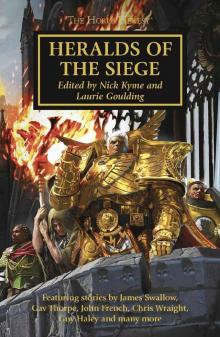 Heralds of the Siege
Heralds of the Siege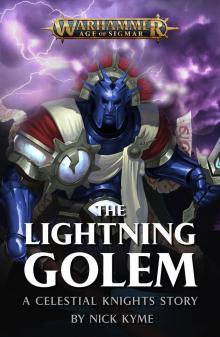 The Lightning Golem
The Lightning Golem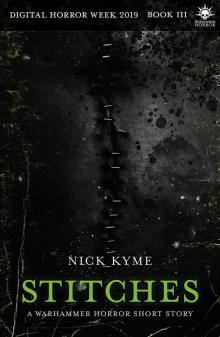 Stitches
Stitches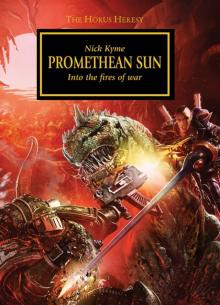 Promethean Sun
Promethean Sun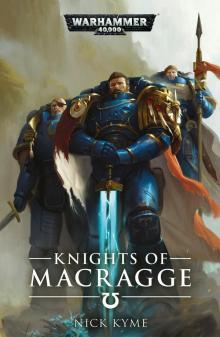 KNIGHTS OF MACRAGGE
KNIGHTS OF MACRAGGE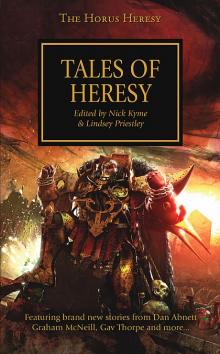 Tales of Heresy
Tales of Heresy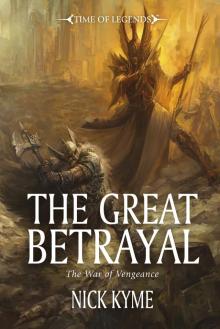 The Great Betrayal
The Great Betrayal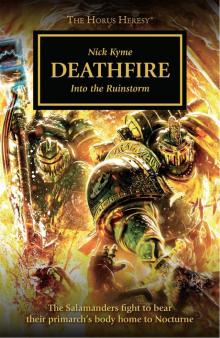 Deathfire
Deathfire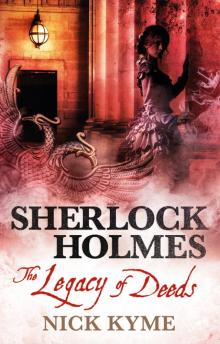 Sherlock Holmes--The Legacy of Deeds
Sherlock Holmes--The Legacy of Deeds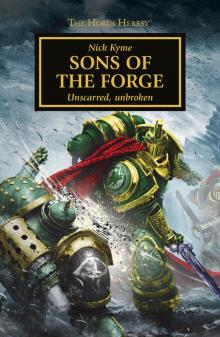 Sons of the Forge
Sons of the Forge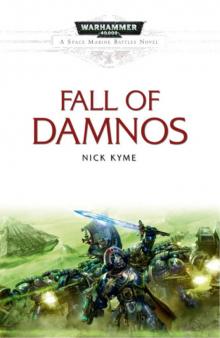 Fall of Damnos
Fall of Damnos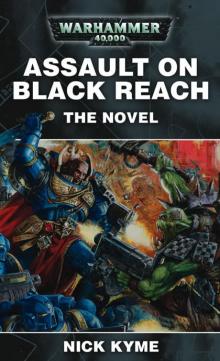 Assault on Black Reach: The Novel
Assault on Black Reach: The Novel![[Horus Heresy 10] - Tales of Heresy Read online](http://i1.bookreadfree.com/i/03/27/horus_heresy_10_-_tales_of_heresy_preview.jpg) [Horus Heresy 10] - Tales of Heresy
[Horus Heresy 10] - Tales of Heresy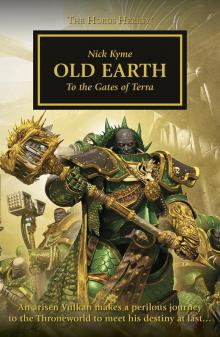 Old Earth
Old Earth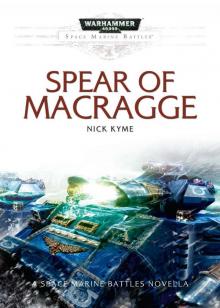 Spear of Macragge
Spear of Macragge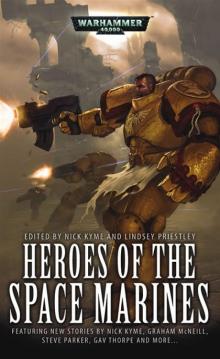 Heroes of the Space Marines
Heroes of the Space Marines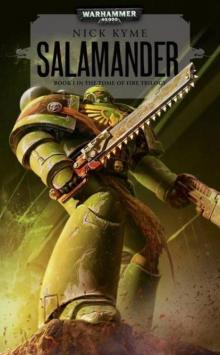 Salamander (warhammer 40000)
Salamander (warhammer 40000)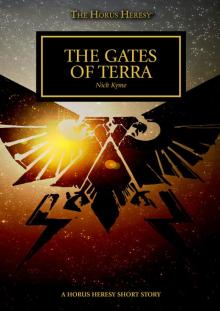 The Gates of Terra
The Gates of Terra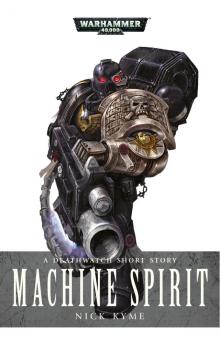 Machine Spirit
Machine Spirit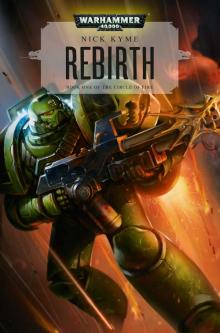 Salamanders: Rebirth
Salamanders: Rebirth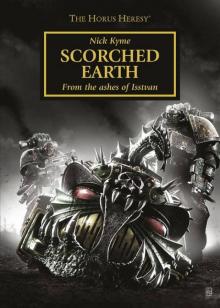 Scorched Earth
Scorched Earth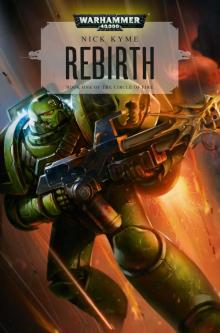 Rebirth
Rebirth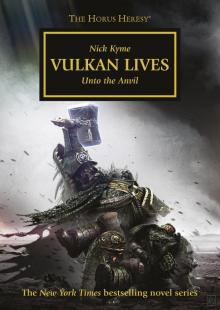 Vulkan Lives
Vulkan Lives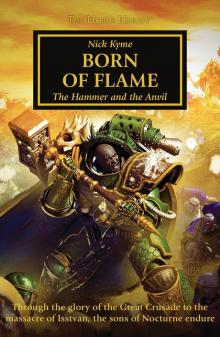 Born of Flame
Born of Flame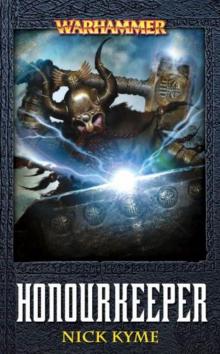 Honourkeeper
Honourkeeper